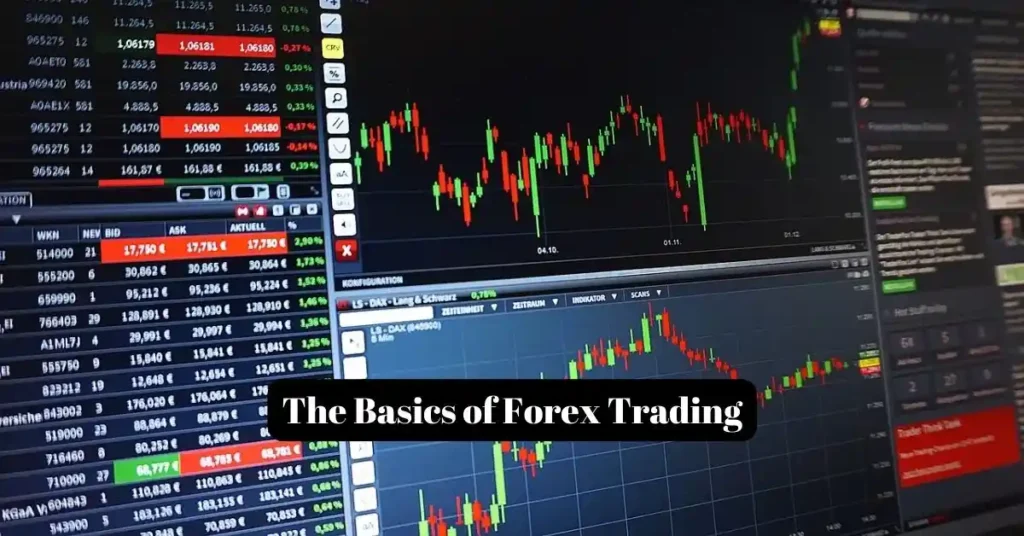The Basics of Forex Trading: A Beginner’s Guide 2023-24

Forex Trading
Forex Trading: Forex is a combination of two words one is Friegn and the second is Exchange. It is also known as foreign exchange, FX, or currency trading. It is a decentralized global market where global currencies are traded (buy and sell) 24 hours a day five days a week. It is the largest liquid market in the world.
Forex is actually the largest market in the world on an average trading day. The forex market trades for five trillion dollars. the way we make money in the Forex market is when this exchange rate rises and falls so these exchange rates fluctuate depending on the strength and valuation of each of these currencies the euro and the dollar.
Forex trading gives us a good opportunity for individuals to participate in the global financial markets. We can make a handsome profit. For earning profit you need to learn Forex trade. Without an understanding of Forex trading, you might lose your money.
In the following article, we are going to provide a comprehensive understanding of forex trading. We also explain some of its basics, key principles, strategies, and tips to get started.
Table of Contents
What is Forex Trading?
Forex trading is nothing but buying and selling currencies with the aim of profiting from the fluctuations in their exchange rates. The currencies are always traded in pairs.
For example, EUR/USD means Euro and US Dollar, or GBP/JPY means British Pound and Japanese Yen. The value of one currency is determined by its comparison to another currency within the pair.
How Does Forex Trading Work?

Forex trade takes place in the global foreign exchange market. The participants speculate on the price movements of different currency pairs. Traders can profit from both rising and falling markets by buying a currency pair if they believe its value will increase or selling it if they expect a decrease. The objective is to buy low and sell high or sell high and buy back at a lower price.
What are the benefits of Forex Trading?
Forex trading offers several advantages for beginners:
- Accessibility: The forex market is accessible to traders worldwide, allowing individuals to participate with relatively small amounts of capital.
- Liquidity: The forex market is the most liquid financial market globally, ensuring that traders can enter and exit positions easily.
- Flexibility: Forex trade allows traders to choose their preferred trading hours due to the market’s 24-hour nature.
- Profit Potential: With proper knowledge and strategies, forex trade offers the potential for significant profits.
Read also: The Ultimate Guide to Financial Planning: Building a Strong Foundation in 2024
What are the Risks Associated with Forex Trading?
In any trading, there are certain elements of risk. So in Forex trading, there is also some risk.
- Volatility: Forex markets can be highly volatile, leading to rapid price fluctuations and potential losses.
- Leverage: Traders often use leverage to amplify their potential returns. However, leverage can also magnify losses.
- Market Complexity: Forex trading involves understanding economic indicators, geopolitical events, and global market trends.
What are the Key Forex Terminologies?
To navigate the forex market effectively, beginners should familiarize themselves with essential forex terminology, including:
- Currency Pair: Forex trading always works on currency pair like EUR and USD. There 8 common currency pairs. The base currency is USD. These are EUR, CAD, GBP, CHF, JPY, AUD, and NZD.
- Pips: The smallest unit of measurement in a currency pair, representing the price movement.
- Lots: Standardized trading sizes used to quantify the volume of forex trade.
- Stop Loss: An order placed to limit potential losses by automatically closing a position at a predetermined price.
- Take Profit: An order placed to automatically close a position when it reaches a specified profit level.
Read also: 10 The Best Ways to Earn Money with AI
Setting Up a Forex Trading Account
To start trading forex, beginners need to follow these steps:
- Research and choose a reputable forex broker.
- Complete the broker’s registration process and verify your identity.
- Deposit funds into your trading account.
- Familiarize yourself with the trading platform and its features.
- Develop a trading strategy and practice on a demo account before trading with real money.
Fundamental Analysis
Fundamental analysis involves evaluating economic, social, and political factors that can influence currency values. Traders analyze indicators such as economic reports, interest rates, and central bank policies to make informed trading decisions.
Technical Analysis
Technical analysis focuses on historical price data, charts, and patterns to predict future price movements. Traders use various tools and indicators to identify trends, support and resistance levels, and entry and exit points.

What are the popular Forex Trading Strategies?
Several popular strategies are commonly used in forex trading:
- Trend Trading: Traders identify and follow established trends in the market.
- Breakout Trading: Traders enter positions when the price breaks through significant support or resistance levels.
- Range Trading: Traders identify price ranges and buy at support levels and sell at resistance levels.
- Carry Trading: Traders take advantage of interest rate differentials between currency pairs.
Risk Management in Forex Trading
Effective risk management is crucial in forex trading. Some risk management techniques include:
- Setting stop loss and take profit levels to limit potential losses and protect profits.
- Diversifying the portfolio by trading different currency pairs.
- Avoiding excessive leverage and using appropriate position sizing.
Developing a Trading Plan
A trading plan outlines a trader’s strategies, goals, risk tolerance, and money management rules. It helps traders maintain discipline and make consistent trading decisions based on predefined criteria.
How to Choose a Forex Broker?
Selecting a reliable forex broker is essential for a beginner’s success. Factors to consider include:
- Regulation and licensing by reputable financial authorities.
- Competitive spreads and trading costs.
- User-friendly trading platform with essential features and tools.
- Access to educational resources and customer support.
Common Mistakes to Avoid in Forex Trading
Beginners in forex trading should avoid these common mistakes:
- Lack of Education: Insufficient understanding of forex trading can lead to costly mistakes.
- Emotional Trading: Allowing emotions to dictate trading decisions can result in poor judgment.
- Overtrading: Opening too many trades simultaneously can lead to reduced focus and increased risk.
Tips for Successful Forex Trading
Follow these tips to enhance your chances of success in forex trading:
- Educate Yourself: Continuously learn about forex trading through books, courses, and online resources.
- Start Small: Begin with a demo account to practice trading strategies before risking real money.
- Plan and Analyze: Develop a trading plan, analyze the markets, and stick to your strategies.
- Manage Risk: Implement proper risk management techniques to protect your capital.
- Stay Disciplined: Maintain discipline, follow your trading plan, and avoid impulsive decisions.
Conclusion
Forex trading can be an exciting and potentially profitable venture for beginners. By understanding the basics, implementing effective strategies, and managing risk, individuals can navigate the forex market with confidence. Remember to stay updated on market trends, continuously improve your knowledge, and adapt your trading approach as needed.
FAQ
Is forex trading suitable for beginners?
Yes, forex trading can be suitable for beginners who are willing to learn and develop their skills.
How much capital do I need to start forex trade?
The required capital varies, but beginners can start with as little as a few hundred dollars.
Can I trade forex part-time?
Yes, forex trading offers flexibility, allowing individuals to trade part-time or as a supplementary income source.
Is forex Riskier than stocks?
The forex market is more volatile and riskier than the stock market.
Can I trade Forex on a mobile device?
Yes, most reputable forex brokers offer mobile trading platforms for trading on smartphones and tablets.






